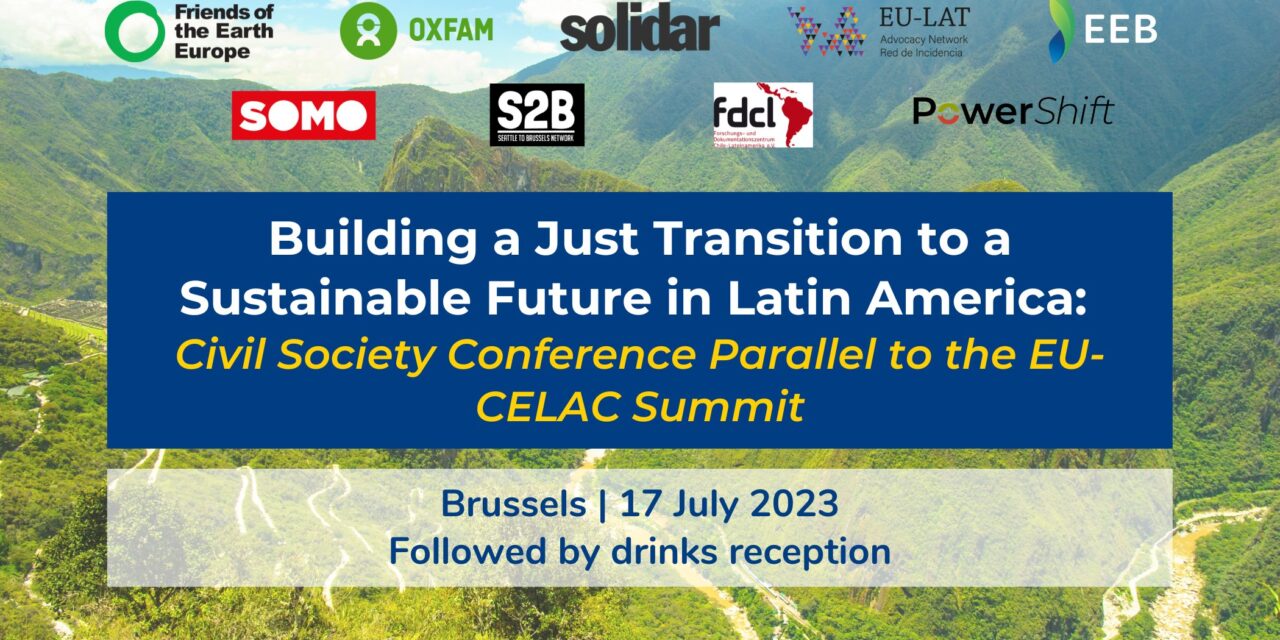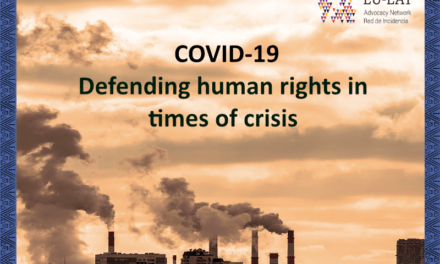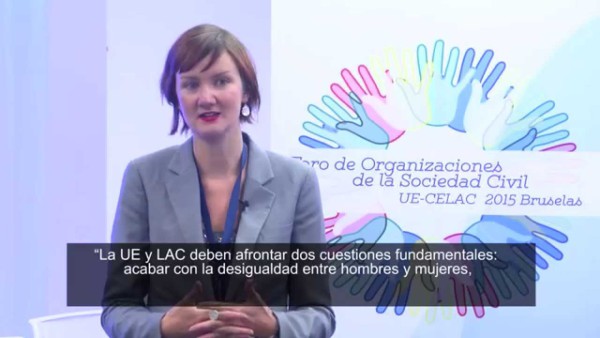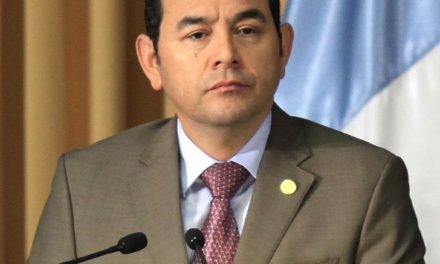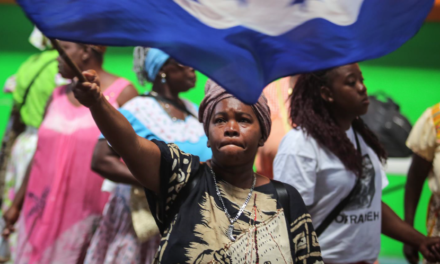Whilst leaders from the European Union, Latin America and the Caribbean met in Brussels on the 17th and 18th of July at the EU-CELAC Summit, the EU-LAT Network co-organised a public event on what a sustainable Just Transition in Latin America should look like.
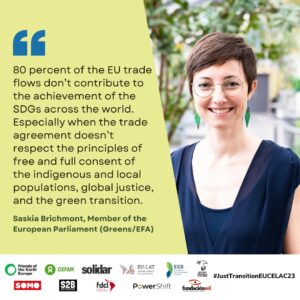 As the EU has been seeking to strengthen its strategic partnership with the region, this Summit represented the next step to speed up the ratification process of the EU-Mercosur, EU-Chile and EU-Mexico trade agreements. This way, the EU aims to expand its access to critical raw materials by establishing “mutually beneficial long-term relationships” with resource-rich countries. At the same time, with a rapidly shrinking civic and democratic space, Latin America is one of the world’s most unequal regions and human rights violations continue to plague indigenous peoples, land- and water defenders. Without strong due diligence measures, the promotion of the digital and green transitions will be established at the expense of local communities and the environment. With growing geopolitical pressures, the narrative in Brussels regarding its development model towards the region has now been transformed into a New Agenda EU-LAC that prioritises political dialogue and investment through the EU’s latest tool ‘Global Gateway’. Yet, this new approach to development and cooperation does not guarantee a Just Transition.
As the EU has been seeking to strengthen its strategic partnership with the region, this Summit represented the next step to speed up the ratification process of the EU-Mercosur, EU-Chile and EU-Mexico trade agreements. This way, the EU aims to expand its access to critical raw materials by establishing “mutually beneficial long-term relationships” with resource-rich countries. At the same time, with a rapidly shrinking civic and democratic space, Latin America is one of the world’s most unequal regions and human rights violations continue to plague indigenous peoples, land- and water defenders. Without strong due diligence measures, the promotion of the digital and green transitions will be established at the expense of local communities and the environment. With growing geopolitical pressures, the narrative in Brussels regarding its development model towards the region has now been transformed into a New Agenda EU-LAC that prioritises political dialogue and investment through the EU’s latest tool ‘Global Gateway’. Yet, this new approach to development and cooperation does not guarantee a Just Transition.
Together with organisations such as the EEB, Solidar, SOMO and Oxfam International, among others, the EU-LAT Network co-organised this event to generate dialogue among international civil society and policymakers to discuss what steps the EU can take to improve its political coherence in its protection and promotion of human rights and environmental justice, and to present possible solutions on how to “Build a Just Transition to a Sustainable Future in Latin America”.
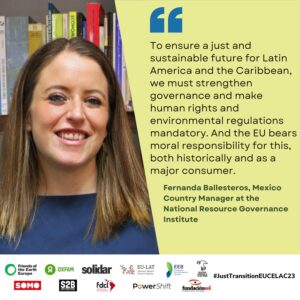 The first panel raised concerns on the impact of the green and digital transition on the mining of raw materials in Latin America, greenwashing sustainability, the Corporate Sustainability Due Diligence Directive, the Critical Raw Materials Act, Strategic Projects in Latin America and Industry Certification Schemes. The panelists discussed the socioenvironmental impacts of mining, the fallacy of “green” and “sustainable” mining and why it is necessary to question the origin of the products used to facilitate digital and green transitions both in the EU and Latin America. Panelist Andrea Sato, researcher at Fundación Sol, explained that “lithium plays a fundamental role in accelerating the transition to electric vehicles and phasing out fossil fuels. Yet, we must acknowledge that the exploitation of territories in the Global South for lithium extraction primarily benefits countries in the Global North, raising concerns about equity and fairness in this renewable energy shift.”
The first panel raised concerns on the impact of the green and digital transition on the mining of raw materials in Latin America, greenwashing sustainability, the Corporate Sustainability Due Diligence Directive, the Critical Raw Materials Act, Strategic Projects in Latin America and Industry Certification Schemes. The panelists discussed the socioenvironmental impacts of mining, the fallacy of “green” and “sustainable” mining and why it is necessary to question the origin of the products used to facilitate digital and green transitions both in the EU and Latin America. Panelist Andrea Sato, researcher at Fundación Sol, explained that “lithium plays a fundamental role in accelerating the transition to electric vehicles and phasing out fossil fuels. Yet, we must acknowledge that the exploitation of territories in the Global South for lithium extraction primarily benefits countries in the Global North, raising concerns about equity and fairness in this renewable energy shift.”
To counter the sourcing of raw materials linked to extractivism, international civil society therefore proposes a transversal, coherent and consistent implementation of protection mechanisms that already exist or that are currently in development: the overall inclusion and compliance to the Due Diligence Directive, the Critical Raw Materials Act, the Escazú Agreement and Guidelines on Human Rights Defenders, among other elements, in all trade, cooperation and investment structures of the EU towards the region, such as in Global Gateway.
To ensure a correct implementation of these mechanisms, transparency of audits on the impact on human rights and the environment is needed to ensure greater accountability in case of violations. In this process, local communities and civil society organisations should be consulted and included to guarantee a consistent monitoring and evaluation, based on a diverse and inclusive participation. On the other hand, civil society actors can increase their tactics of resistance by demanding a consistent flow of information by the authorities and companies on policies and projects and by reinforcing articulation and alliances among civil society and communities on national and local level to enhance advocacy strategies.
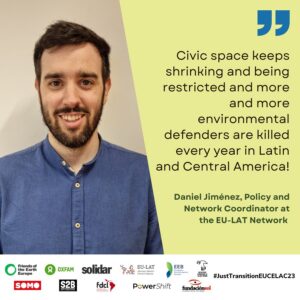 In order to tackle the adverse impacts on human rights, its defenders and socioeconomic equality, the second panel stressed the need to implement clear indicators in the renewed EU-LAC relations that prioritise the protection and promotion of civic space. Against the backdrop of state capture, the socioeconomic exclusion indigenous and afro communities and the differential impact of extractivism on women as primary caregivers of society, a different EU-LAC cooperation model needs to be established based on solidarity to prevent an imbalanced impact of the north on the south.
In order to tackle the adverse impacts on human rights, its defenders and socioeconomic equality, the second panel stressed the need to implement clear indicators in the renewed EU-LAC relations that prioritise the protection and promotion of civic space. Against the backdrop of state capture, the socioeconomic exclusion indigenous and afro communities and the differential impact of extractivism on women as primary caregivers of society, a different EU-LAC cooperation model needs to be established based on solidarity to prevent an imbalanced impact of the north on the south.
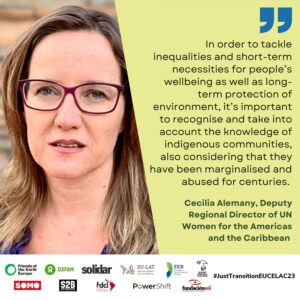 As such, key recommendations refer to the review and examination of outstanding loans or grants from financial institutions to ensure that they are not granted to individuals or entities involved in cases of corruption or human rights violations, to programmatic actions linking lack of transparency and accountability to human rights abuses, the creation of safe reporting mechanisms for human rights abuses, the creation of safe and open dialogue channels and support mechanisms in all regional areas. On top of that, the reduction of inequalities and the promotion of civic space should be included as key objective of the Global Gateway strategy, to ensure political coherence, transparency and compliance to the SDG’s. To ensure a sustainable transition in the region, a bi-regional EU-LAC policy agenda for the financing of social policies, civic space and/or just transitions aimed at reducing inequalities and avoiding austerity measures should be promoted and included in the political dialogue, with a special focus on the recognition and inclusion of women, afro and indigenous communities.
As such, key recommendations refer to the review and examination of outstanding loans or grants from financial institutions to ensure that they are not granted to individuals or entities involved in cases of corruption or human rights violations, to programmatic actions linking lack of transparency and accountability to human rights abuses, the creation of safe reporting mechanisms for human rights abuses, the creation of safe and open dialogue channels and support mechanisms in all regional areas. On top of that, the reduction of inequalities and the promotion of civic space should be included as key objective of the Global Gateway strategy, to ensure political coherence, transparency and compliance to the SDG’s. To ensure a sustainable transition in the region, a bi-regional EU-LAC policy agenda for the financing of social policies, civic space and/or just transitions aimed at reducing inequalities and avoiding austerity measures should be promoted and included in the political dialogue, with a special focus on the recognition and inclusion of women, afro and indigenous communities.
For more information on civil society recommendations on the green transition, trade, Global Gateway, civic space and social equality, take a look at our position paper “Latin America and the Caribbean and the European Union: towards a real renewed political partnership. Civil society proposals to strengthen the bi-regional relationship” here.
Event program:
17:15-17:20 – Welcome Diego Francesco Marin, European Environmental Bureau
17:20-17:30 – Opening remarks MEP Saskia Bricmont, Greens/EFA
17:30 – 18:30 – 1st Panel: Greenwashing Sustainability in Latin America: The Critical Raw Materials Act – Strategic Projects in Latin America and Industry Certification Schemes
- Panellists:
- Ramon Balcazar, Observatorio Plurinacional De Salares Andinos; Chile, Bolivia, Argentina
- Alejandro Gonzalez, Centre for Research on Multinational Corporations (SOMO); Netherlands
- Raiara Pires, Movimento Pela Soberania Popular na Mineração; Brazil
- Andrea Sato, Fundación Sol; Chile
18:30 – 18:40 – Audience Questions and Answers
18:45- 19:45 – 2nd Panel: Achieving a Just Transition for All: The Role of Human Rights, Civic Space and Socio-Economic Inequalities
- Panellists:
- Inequalities – Gloria Isabel Garcia-Parra, Oxfam International
- Civic space – Daniel Jiménez, EU-LAT Network
- Just Transition – Verónica Sajbin Velásquez, Movimiento por la Paz, el Desarme y la Libertad (MPDL) Guatemala
- Trade – Maureen Santos, Brazilian Front against EU-Mercosur/FASE
- Indigenous Rights – Kreta Kaingang, Articulation of Indigenous Peoples of Brazil
19:45 – 19:55 – Audience Questions and Answers
19:55 – 20:00 – Closing remarks Cecilia Alemany, UN Women Americas and the Caribbean

